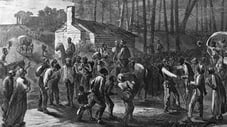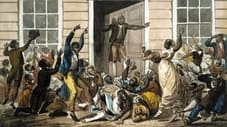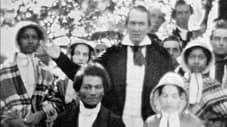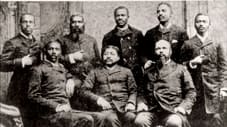Justin Jackson as Reenactor
Episodes 4
The Downward Spiral
The 1620s. Eleven men of African descent and mixed ethnicity enter into slavery in New Amsterdam. Working side by side with white indentured servants, these men labored to lay the foundations of the Dutch colony that would later become New York. No law then defined the limitations imposed on slaves. Anthony d'Angola, Emmanuel Driggus, and Frances Driggus could bring suits to court, earn wages, and marry. After the 1731 Stono Rebellion, many colonies adopted strict "black codes" transforming the social system into one of legal racial oppression.
Read MoreLiberty in the Air
The 1740s to the 1830s. As the slave population reproduces, American planters become less dependent on the African slave trade. Ensuing generations of slaves develop a unique culture that blends elements of African and American life. African Americans, including Thomas Jefferson's slave Jupiter, Colonel Tye, Elizabeth Freeman, David Walker, and Maria Stewart, respond to the increasingly restrictive system of slavery. The Revolutionary War reveals the contradictions of a nation seeking independence while simultaneously denying freedom to its black citizens.
Read MoreSeeds of Destruction
1800. Vermont leads the Northern states in abolishing and phasing out slavery, while the South begins its greatest expansion. As the nation develops westward and cotton replaces tobacco as its most valuable crop, slavery is increasingly divisive. African American slaves Harriet Jacobs and Louis Hughes escape bondage to expose the horrific realities of the slave experience in autobiographical narratives. These and other stories of physical, psychological, and sexual exploitation reinvigorate the Northern abolitionist movement led by Frederick Douglass, Sojourner Truth, and Amy Post.
Read MoreThe Challenge of Freedoms
Civil War and Reconstruction. The war shifts from a struggle for union to a battle over slavery. Blacks, such as South Carolina slave and future congressman Robert Smalls, contribute to the war effort and experience gains and losses from Reconstruction. The 13th, 14th, and 15th amendments abolish slavery and guarantee black civil rights, and the Freedmen's Bureau offers aid to former slaves throughout the 1870s. But militant groups such as the Ku Klux Klan threaten the future of racial equality, and segregation laws begin appearing across the country. Slavery's eradication does not end black oppression.
Read More



